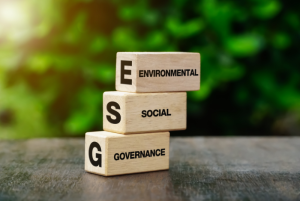@ the IERP® Global Conference, August 2024
Kamran Khan, Deutsche Bank’s Head of ESG for Asia Pacific, Middle East & Africa, pointed out that sustainable finance is about doing more good, taking things further and pushing the envelope, and setting new industry standards. Companies should engage in sustainable finance and ESG for many reasons: regulatory requirements, physical risk, and financial risk. “If you are in a sector or company that has a bad sustainability profile, you can expect your cost of capital to go up over time,” he said, adding that this was already happening in the coal industry.
It was just a matter of time before it expanded to other industries. The cost of capital is one of the most important reasons why a company must look at sustainability. Getting green certification was now a commercial issue, not a public relations exercise. Citing the example of data centres, he said that the data centres’ biggest customers were usually big tech companies like Facebook and Twitter that not only pay the most but also have a strong commitment to ESG and sustainable finance. They expect their data centres to be clean because they need their brand to be seen as sustainable.
Another critical reason is a company’s own staff. “If you are recruiting in a highly competitive market, like the tech companies and banks…you’d better have a very good sustainable profile as a company because these people are not willing to work for a company that they don’t agree with or are ashamed of,” he stated. ‘Sustainable finance’ usually means financing a company that is making a transition towards sustainable practices; how this is defined, matters. “If it is defined in a very European or Western way…we will have a serious problem,” he warned.
“Asian companies, especially in middle-income countries and fast emerging economies, will not follow the path. They will say…you polluted the earth for decades and then we started to develop, (but) you now tell us this is polluting and we can’t do it like that.” He said that the big corporations in this part of the world really need to step up and show up at the right meetings to provide their perspective. About 50% of global trade originates from APAC, and about 50% of manufacturing for the global economy happens in this region; APAC is also a global source for raw materials.
If Asian economies selling to North America and Europe are subject to trade regulations that restrict the import of products from Asia Pacific based on the ESG profiles of companies, there would be extensive trade disruption. As an example, if the EU only allowed imports of cars made with ‘green’ steel, how would green steel be defined? There are two key elements to this: renewable energy and the actual technology that is used to manufacture green steel. The intellectual property for this technology resides in Europe and is not cheap.
“Imagine if you were Mexico, which is a big exporter of cars but does not have as much renewable energy,” he said. “What will happen to their market position a few years from now, if such a rule is enacted?” Trade and sustainability are connected. “Discussions that used to happen in the COP or environmental meetings, are increasingly going to move towards the WTO negotiations in the coming years,” he warned. Another facet of this issue is commercial trade, where no regulator is involved.
If you are manufacturing something in Asia and selling to customers in Europe or North America – like Nike shoes, for example – and Nike decides that all its shoes must meet certain supply chain requirements – you have a problem. “It’s just you and the buyer, and the buyer is saying they cannot buy because you are not sustainable enough in your operations,” he said. He identified the cost of capital as a key issue for companies that need foreign exchange. “If you need to buy equipment from overseas, or raise money in Euros or Dollars, you cannot avoid this,” he said.
“You have to show your ESG profile, and your cost of capital starts to increasingly depend on it.” Another important related factor is the government’s cost of capital. “It hasn’t happened yet, but we will see treasury bonds raised by different governments being affected based on how good a track record the government has in curbing pollution and fighting climate change,” he cautioned. He suggested that companies consider four questions when developing an ESG or sustainability framework:
- why they want to do it;
- what constitutes sustainability in their business;
- where they want to be when transitioning towards sustainable practices and what target to set; and
- how to proceed with the data derived from their efforts.
He also advised attaching a sustainability strategy to a financing programme or instrument as this could make it more believable or acceptable. “Doing a financial transaction with legal agreements when you’re signing your commitments to a sustainability target is critical,” he said. “People believe you when you actually say ‘we will do this, and here we are signing off on this legal agreement which says so.’ In some cases, the agreement says that the company will have to pay a penalty if it doesn’t meet its targets.”
Attaching strategy to financing is also extremely important for the CSO and other sustainability teams inside the company because they now have to deliver a requirement. Noting that people tend to make a big deal out of ESG ratings, he advised keeping track of such ratings, but not to be overly influenced by them. Companies which say they do not have the necessary data should understand the metrics of what constitutes sustainability for their business, and measure these. Many companies feel compelled to convert (to sustainable practices) within months or years, but he advised them instead to set incremental targets that make sense from a business perspective.


























